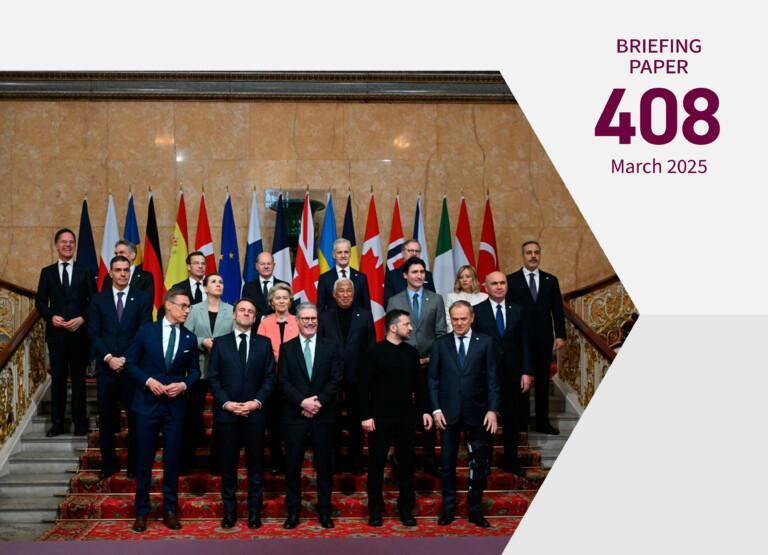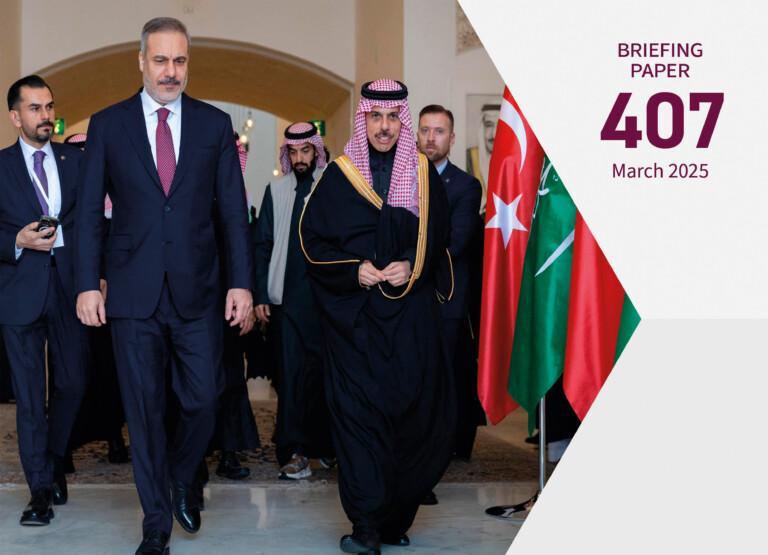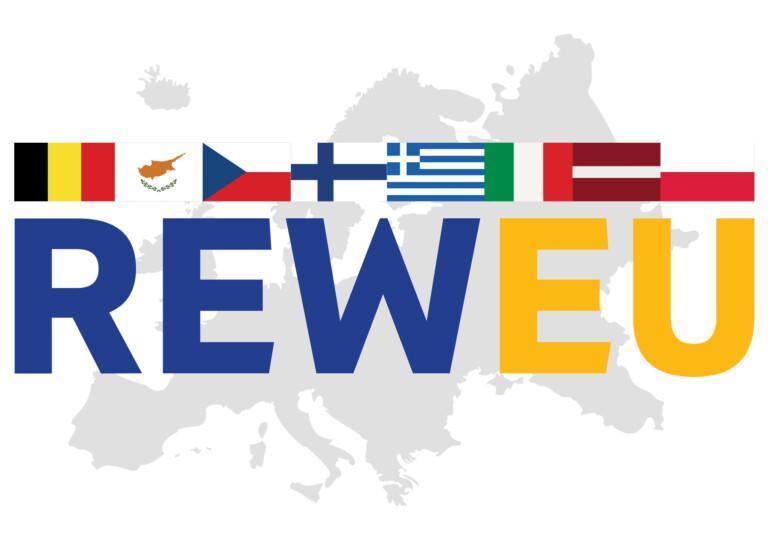
Tensions in the transatlantic partnership are spurring the German debate on how to prepare for the possibility of a post-Atlantic Europe.
Germany has renewed its focus on the EU’s security and defence policy. This includes long-term initiatives to improve European operational readiness, as well as recognition of the EU mutual assistance clause in the doctrine of the German armed forces.
However, efforts by German politicians to convince the public of the need for a greater international engagement face difficulties as Germans see the threat as negligible and eye the military with suspicion.
The challenge for Berlin remains to step up the ambition for European defence cooperation, while avoiding new fault lines among EU members.
Introduction
Germany is facing a challenging strategic environment. Its foreign and security policy since the end of the Cold War was mostly based on the assumption of the continuing success of the peaceful and liberal model of ‘the West’. The 21st-century storyline seemed to be in place: The European integration process succeeds, Russia and China turn into strategic and increasingly democratic partners, and the US – following its own interests – continues to be the backstop for European security and the international multilateral system.
As a consequence, the ‘Berlin Republic’ de-invested in its military, pushed the further development of the EU institutional and legal framework, and concentrated on its economic development through export markets around the world.
In recent years, Germany has had to wake up to the reality that the foundation on which it built its success is not as solid as it seemed. The economic and refugee crises have taken their toll on EU cohesion and have intensified illiberal tendencies in some member states, such as Hungary or Poland. Hopes of a liberalization of Russia’s socio-economic model did not materialize, while foreign policy under President Putin focused on shows of strength in Ukraine or Syria instead. Since the election of Donald Trump, the strongly transatlantic-oriented German foreign policy community is seriously concerned that this US presidency is not just a passing phenomenon, but an expression of a deepening US fatigue when it comes to playing the role of a guarantor of European security.
This Briefing Paper analyzes how Berlin’s security and defence policy has reacted to the shifts in Germany’s strategic environment. Although international partners and defence experts often criticize Germany for its comparatively low level of military spending, Berlin’s foreign and security policy as well as the German armed forces have undergone incremental changes in recent years that will have a decisive impact on Germany’s posture in the long run. One notable change is that Germany is hedging against the risk of US retreat and steadily developing the EU as a complementary security framework to NATO. However, public opinion in Germany does not yet acknowledge the threats that emanate from the deteriorating strategic environment, leaving German policymakers with the difficult task of explaining the need for greater German international political and military commitment.
Germany’s strategic debate
The challenges that Germany is facing were painfully obvious during the 2018 NATO summit in Brussels. It seemed as if President Trump had singled out Germany as the prime example of what he perceives as a disadvantageous partnership with European allies. Germany was in no uncertain terms attacked as one of the “rich NATO nations” that “pay only a fraction of their cost”, while at the same time reaping the benefits of trade with Russia and the US. More subtle arguments, for example that Germany is the second largest troop contributor to NATO missions, did not seem to resonate much in the White House.
The assertive way in which the US is trying to enforce the compliance of European companies with US sanctions against Iran is another example that makes German officials seriously concerned about the US partnership turning confrontational. The reinstated US sanctions against Iran put the US policies in direct confrontation with German security and economic interests. While Germany, along with other EU member states, wants the trade relationship with Teheran to prosper in order to secure the Iran nuclear agreement, the US actively limits trade in order to re-exert maximum pressure.
As the Trump presidency nears its second half, it becomes more likely that the current US policies will have a lasting effect on future administrations. A limited ‘dry spell’ in the transatlantic partnership could turn into a more protracted and transformative crisis.
The effect of these and similar incidents on the German discussions is palpable. Chancellor Merkel’s remarks that “Europe takes its fate into its own hands” still raised eyebrows after President Trump’s first visit to Europe in May 2017. The following autumn, the German transatlantic-oriented foreign policy community reacted strongly against calls to consider a post-Atlantic Europe and warned against the consequences of a strategic re-orientation of Germany away from the US.1 However, after another painful year in the transatlantic partnership, even Atlanticist voices underline the need for Europeans to be prepared “to be left alone”.2 This even led to a discussion among academics and think-tankers as to whether Germany – “without nuclear protection provided by the United States, and thus defenceless in an extreme crisis”3 – should acquire a nuclear bomb. While the intellectual discussion on a German nuclear deterrence never led to any practical considerations, a German debate on alternatives to the US security guarantee is developing.
Despite all the concerns about the transatlantic partnership, closer relations with Russia or China are not seen as a feasible alternative. Instead, the social democratic German foreign minister, Heiko Maas, recently called for a network of countries with shared support for the rules of the post-war order. This “alliance of multilateralists” – including Japan or Canada, for example – should work together in enforcing international law and securing the functioning of international institutions.
At the heart of the German reaction, however, is a renewed focus on the European Union as an international and security actor. The coalition agreement from spring 2017 states that “we have to stay transatlantic, but become more European”. The German foreign minister repeatedly declared that the German answer to “America first” has to be “Europe United”. However, while calls for European unity are popular and easily made, it is more difficult to discern the practical implications of the German debate for the EU and defence polices.
EU defence: playing the long game
A renewed German emphasis on EU defence predates the election of President Trump. Security developments in 2015 in particular encouraged the German government to accelerate the process of deeper defence integration, which had mostly come to a halt. The protracted war in Syria and peaking levels of immigration underlined the need to introduce more effective European instruments and capabilities to handle instabilities in the south of Europe. The EU duly launched its Operation Sophia naval mission in the Mediterranean in June 2015. After the Paris terror attacks in November, France was the first member state to ask for aid under the EU mutual assistance clause (Article 42(7) TEU), with Germany joining the Anti-ISIL coalition in Syria a short time later.
Developments on the ground were complemented by a fresh wave of conceptual thinking in Brussels and Berlin that led to simultaneous crafting of the EU global strategy and the White Paper on German Security Policy. Despite the disappointment with the result, the 2016 Brexit referendum allowed progress on some of the blocked defence reforms that were prioritized in the EU global strategy. In particular, Germany had long pushed for the creation of an EU military headquarters, which came to fruition in summer 2017 in the form of the Military Planning and Conduct Capability. The limited mandate of the headquarters in charge of training missions suited Germany’s balanced approach to EU defence, which traditionally aims to avoid duplicating NATO structures.
Germany’s pet project, however, became the activation of the Permanent Structured Cooperation (PESCO) in the EU treaties. The Lisbon Treaty offered the opportunity for a group of member states “whose military capabilities fulfil higher criteria” to establish closer cooperation “with a view to the most demanding missions” (Article 42(6) TEU). While the government in Berlin wanted to use the potential of this framework, it believed the timing for forming a ‘core Europe’ on defence was off. It wanted to prevent new dividing lines between defence insiders and outsiders in an EU that already lacked cohesion after the euro and refugee crisis, and insisted on an inclusive approach. Instead of approaching the design of PESCO from the immediate operational needs of the military, Germany approached the project from an EU political angle. Once the right institutions were in place, or so the German thinking went, the framework would provide guidance when reacting to various capability needs in the long term.
Eventually, PESCO became a different construct than initially intended. Even officials in Berlin admit that in the short term, the 25 member-strong group is not designed as a basis for running demanding missions. For example, among the PESCO projects that Berlin leads are a network of logistics hubs and a medical command. PESCO’s main achievement is to formalize previously declarative member-state commitments to defence investments in an EU legal framework and to link those goals to a system that monitors progress.
Defence experts and proponents of an operational EU defence criticized the largely German-designed PESCO for being a legalistic solution that repackages old, never-materialized defence commitments and projects without addressing operational needs. These shortcomings prompted France to introduce its own European Intervention Initiative (EI2). One can’t help noticing that the EI2 is the opposite of PESCO. It has a light institutional structure, supported in the beginning by a unit in the French defence ministry and regular military staff talks. EI2 aims to enhance the ability to launch joint military operations and allows non-EU or CSDP members, such as the UK and Denmark, to participate.
It is questionable whether Germany would have joined the EI2 were it not for the changes in its strategic environment. Berlin officials were concerned that the French project absorbs the political resources of PESCO members and undermines EU cohesion by merely being an exclusive group of capable militaries. Some sceptics feared that EI2 might mainly serve French operational needs that its overstretched military struggles to meet in the Southern neighbourhood.
Yet with constant calls for a strong Europe amidst a strained transatlantic alliance, it became politically very costly for Germany to reject the French offer to join. In addition, German defence experts argued that Germany can much better influence the future of the initiative from the inside than as an outsider.4 In the ideal case scenario, Germany can make PESCO and EI2 complementary and mutually reinforcing. Seemingly, Germany has already put its foot down, ensuring that the founding document states that “EI2 serves the objectives and projects of PESCO to the maximum extent possible”.5
In a notable and unprecedented step, the new concept of the Bundeswehr mentions the EU as a system of collective defence. The highest doctrinal document of the German armed forces seemingly puts NATO and the EU on a par with each other by declaring that “the Bundeswehr fully contributes to the (collective) alliance defence – in accordance with the alliance or mutual assistance obligations of NATO or the EU”.6 The first activation of Article 42(7), as well as the tensions in NATO, prompted German military planners to think through the implications of the EU mutual defence commitments.
It is easy to dismiss recent changes when looking at Germany’s role in EU defence cooperation only from the perspective of military demands and posture. Berlin mainly develops the EU in areas that are complementary to NATO’s focus, such as cooperation on defence research and industry or a geographical emphasis on the Southern Mediterranean area. It advances cautiously and concentrates for the most part on the long-term gains of joint military investments rather than quick operational achievements. However, for a government that is deeply committed to, and existentially dependent on NATO security guarantees, a European hedging strategy is not pursued lightly. Some of the steps along the way, such as joining the EI2 outside the EU treaty framework, would have been unthinkable in the absence of the negative shifts in the strategic environment.
Beyond spending: the transformation of the German armed forces
Although Germany has started to increase its defence spending, it will very likely not meet the 2024 NATO target to spend 2% of its GDP on defence. The government just recently announced that it would increase the defence budget by 4bn euro in 2019 to 42.9bn euro. This would translate into 1.31% of GDP. Most of this increase is allocated to maintenance and procurement of materiel. The provisional plans for the ensuing years until 2022 only indicate modest increases. As a consequence, the share of defence spending as a part of GDP will likely fall again, if the German economic growth continues at its current rate of 1.8% per year. Even a 1.5% GDP share of defence spending until 2024, as recently announced by German defence minister Ursula von der Leyen, is an ambitious goal considering these numbers.
The 2% NATO spending target is often criticized for being an arbitrary measure that says little about the actual capability needs or effectiveness of an individual country’s spending. While this criticism is shared in Germany, there is considerable consensus among defence experts and politicians that the current shortfalls in the German armed forces need to be addressed. The 2017 yearly report by the parliamentary ombudsman for the armed forces describes the low level of readiness due to delayed repairs and missing spare parts.7 One of the many listed shortfalls was a critically low level of functioning Leopard 2 battle tanks, as only 95 out of 244 units were operational. It shows that the trend reversal after decades of de-investment is slow, not least because more than a thousand positions remained unfilled in the procurement office.
While investments will be needed to address serious military capability shortfalls, the changes to the Bundeswehr concern more than just fulfilling spending goals. The German armed forces are currently undergoing a major shift in their strategic and operational focus. For example, the new Bundeswehr concept included an ambitious re-prioritization of territorial and allied defence. After Germany concentrated on out-of-area missions and crisis management tasks in the decades after the Cold War, territorial defence is now defined as an equally important priority for the armed forces once again. As a consequence, German defence planners expect reinvestments in conventional air, sea and land capabilities.
The cyber and information space is another area that is receiving considerable attention and resources in the current transformation of the German armed forces, being acknowledged by the new doctrine as a key operational area for the Bundeswehr after land, sea or air activities. The German armed forces realized that control of the information space can quickly become vital for their operations when German soldiers were falsely accused of raping a Lithuanian girl during their deployment in the Baltics.8 Cyber and disinformation activities conducted by Russia and other foreign actors have been a growing concern for the Bundeswehr and led to the creation of a separate branch in the armed forces solely dedicated to addressing these new challenges.
Popular support: less war, more Europe
While German defence planners and a large contingent of the political elite have realized that the challenging strategic environment requires adjustments to German defence policy, including higher military investments, popular support is still lacking. In a series of speeches in early 2014, German politicians set out to convince the public that Germany needs to step up its international engagement if it wants to preserve stability in Europe and beyond.
However, the effect of the ‘German responsibility’ discourse on public perception has remained marginal. The crises of recent years had some effect on how Germans perceive their country’s international role. In 2015, at the peak of the refugee crisis, support for German international engagement spiked at 66%. However, it has stagnated since then, dropping to 59% in 2017.9 Germans also have a clear preference for diplomacy (84%), maintaining that military engagements should concentrate on training (59%) and stabilization (56%) missions.10
The disregard for the military as a tool in international relations becomes evident when Germans are asked about military budgets. The need for higher defence expenditure is still not a majority position and polls at 47%.11 This is a remarkable increase from 2013 pre-Ukraine crisis levels when only 19% of Germans saw the need for a defence expenditure increase. However, the latest discussion on the German defence budget showed that military expenditure continues to be a tough sell for German politicians. “Billions for tanks instead of child day-care centres” ran the headline in Spiegel Online, one of the most widely read German news websites, when Chancellor Merkel spoke out for higher defence expenditure earlier this year.
In addition, the low threat perception of German citizens contributes to a lukewarm stance towards the military. The instability in the south and the terror attacks in Europe seem to have had an effect as Germans list migration (54%), terror attacks (53%) and religious fundamentalism (48%) as perceived threats to their personal security. However, the conflicts in Syria and Iraq (27%) or Russia (26%) remain remote as far as the average German is concerned.12 In view of substantial public indifference towards the new Russian assertiveness, the reinvestments in capabilities for territorial defence will likely be met with scepticism.
Differences in the public perception might be due to lack of knowledge about Germany’s international engagement. 53% of Germans have not heard about Germany’s engagement in Lithuania as part of NATO’s Enhanced Forward Presence. Citizens are equally unaware of Germany’s engagement in Mali, even though it is the second largest area for German troop deployment after Afghanistan.13 With little knowledge of how the German military is spending money, it is hardly surprising that the debate quickly turns to ‘pacifist’ versus ‘warmonger’ arguments. The broader set of tasks that the modern German armed forces have to undertake, including those in the cyber and information space, is often overlooked in the discussion.
German politicians will have to invest further in communicating the current shifts in the country’s defence role. However, with regard to the increased focus on the EU as a security framework, German policymakers can count on strong public support. 88% of German citizens support the statement that European partnerships should be a future priority of Germany’s defence policy (only 9% still prefer the transatlantic partner).14 This is an astonishing result when considering the traditionally closely-knit German-US security partnership in NATO and surely reflects a certain ‘Trump effect’ on German attitudes. However, according to Eurobarometer results, German support for the CSDP has always been around 80% and above the EU average since the 1990s. Framing further investments in defence as a European effort to adapt to a changing strategic environment – and not as a reaction to US demands – might help in securing popular support for closing the capability gaps.
Conclusions
Germany has always been a country that prides itself on its continuity in foreign policy, rather than announcing sudden reactions to international developments that turn out to be unsustainable. Thus, it is even more important to recognize the shifts in the long-term trend that have the potential to set German foreign and security policy on a new trajectory. While the 1990s promised an end to instability in Europe and caused Germany to focus its defence role on out-of-area crisis management, the current decade has witnessed a German refocus on Europe. Germany has increased its emphasis on the EU as a security framework and strengthened its commitment to territorial defence and stability in Europe’s neighbourhood. Connected to this refocus is the adaptation of the German armed forces to new 21st-century threats, especially in the cyber and information space.
The adaptation is still ongoing, and its success also depends on domestic policy. While a large part of the German foreign policy elite is convinced about strengthening military investments and European partnerships, the German public remains sceptical of an increased focus on defence.
The current adjustments pose both an opportunity and a challenge for Germany’s European partners. More than ever in its history, Germany is willing to engage in bilateral and EU defence initiatives, such as PESCO, the EI2 or the NATO framework nation concept, which aim at increasing efficiency and integration on defence matters. The result could be a more capable EU and European pillar of NATO. New areas in particular, such as cyber and information warfare, could benefit from improved cooperation.
However, there are challenges on the horizon. Germany and its partners need to ensure that the multitude of different frameworks do not consume unnecessary political resources in smaller EU member states, but mutually reinforce each other instead. In addition, not all member states will be willing or able to participate in the different initiatives because of their militarily non-aligned status or constrained resources. Germany traditionally ensured that the EU, as the most integrated and inclusive political framework, stayed at the centre of efforts to create cohesion among European partners. The challenge remains for Berlin to increase the ambition for European defence cooperation, while avoiding new fault lines.
Endnotes
1 ‘In Spite of It All, America’. The New York Times. October 11, 2017. https://www.nytimes.com/2017/10/11/world/europe/germany-united-states-trump-manifesto.html. Last accessed 4 September 2018.
2 Wolfgang Ischinger: ‘For Allies, Trump’s Behavior Is Painful to Watch’. The New York Times. July 21, 2018. https://www.nytimes.com/2018/07/21/opinion/sunday/trump-europe-nato-russia.html. Last accessed 4 September 2018.
3 Author’s translation. Christian Hacke: ‘Eine Nuklearmacht Deutschland stärkt die Sicherheit des Westens’. Die Welt. July 29, 2018. https://www.welt.de/politik/deutschland/plus180136274/Eine-Nuklearmacht-Deutschland-staerkt-die-Sicherheit-des-Westens.html. Last accessed 4 September 2018.
4 Christian Mölling & Claudia Major: Why joining France’s European Intervention Initiative is the right decision for Germany. Egmont Institute. June 15, 2018. http://www.egmontinstitute.be/why-joining-frances-european-intervention-initiative-is-the-right-decision-for-germany/. Last accessed 4 September 2018.
5 Letter of Intent between the defence ministers of Belgium, Denmark, Estonia, France, Germany, the Netherlands, Portugal, Spain and the United Kingdom concerning the development of the European Intervention Initiative (EI2). French Government. June 25, 2018. https://www.defense.gouv.fr/content/download/535740/9215739/file/LOI_IEI%2025%20JUN%202018.pdf. Last accessed 4 September 2018.
6 Author’s translation. Konzeption der Bundeswehr. Bundesministerium der Verteidigung. July 20, 2018. p. 22. https://www.bmvg.de/resource/blob/26544/9ceddf6df2f48ca87aa0e3ce2826348d/20180731-konzeption-der-bundeswehr-data.pdf. Last accessed 4 September 2018.
7 Annual Report 2017 from the Parliamentary Commissioner for the Armed Forces, German Bundestag. February 20, 2018. https://www.bundestag.de/blob/554772/e70a53c4708baed83f7ceba9e2e954f4/annual_report_2017_59th_report-data.pdf. Last accessed 4 September 2018.
8 ‘NATO: Russia targeted German army with fake news campaign’. DW News. February 16, 2017. https://www.dw.com/en/nato-russia-targeted-german-army-with-fake-news-campaign/a-37591978. Last accessed 4 September 2018.
9 Sicherheits- und verteidigungspolitisches Meinungsbild in der Bundesrepublik Deutschland. Center for Military History and Social Sciences of the Bundeswehr 2017, p. 25. https://www.reservistenverband.de/custom/download/Downloads_2017/171120_Umfrage_ZMSBw.pdf. Last accessed 4 September 2018.
10 Ibid, p. 27.
11 Ibid, p. 64.
12 Ibid, p. 21.
13 Ibid, p. 74.
14 The Berlin Pulse: Germany’s foreign policy perspective. Körber Stiftung 2017, p. 37. https://www.koerber-stiftung.de/fileadmin/user_upload/koerber-
stiftung/redaktion/berliner-forum-aussenpolitik/pdf/2017/The-Berlin-Pulse.pdf. Last accessed 4 September 2018.










